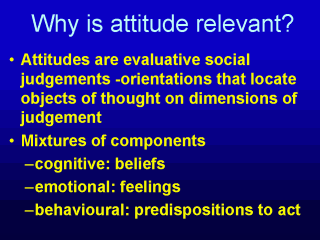| front |1 |2 |3 |4 |5 |6 |7 |8 |9 |10 |11 |12 |13 |14 |15 |16 |17 |18 |19 |20 |21 |22 |23 |24 |25 |26 |27 |28 |29 |review |
 |
Attitudes are value-ladened
social judgements which possess a strong evaluative component. They are ways of viewing a
particular set of values within a framework of different judgement criteria. We all have
attitudes, lots of them, about almost everything, particularly socially-relevant things to
do with behaviour of ourselves and others. Attitudes are constructs that psychologists have defined to help explain the values people hold - they have no “real”, objective existence as such, but can be shown to have different components. These include cognitive (belief), emotional (feeling) and behavioural (predispositional) elements. Recall something you feel strongly about. There, you have an attitude! Consider the different parts of this attitude: how you think about the subject affects how you feel, and it may generate a feeling of needing or wanting to do something about it. Attitudes even bias the kinds of things a person will remember about an event and even the kinds of information they will seek out on a subject. This usually reinforces the attitude. If you want to find out more about attitudes, you can look in Weiten: Psychology:Themes and variations (1992) |